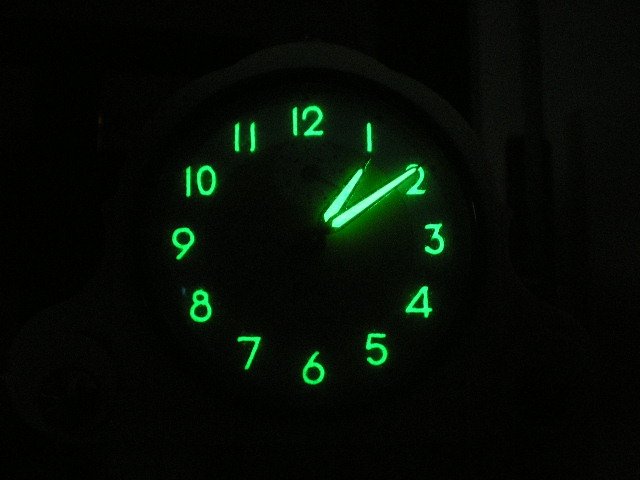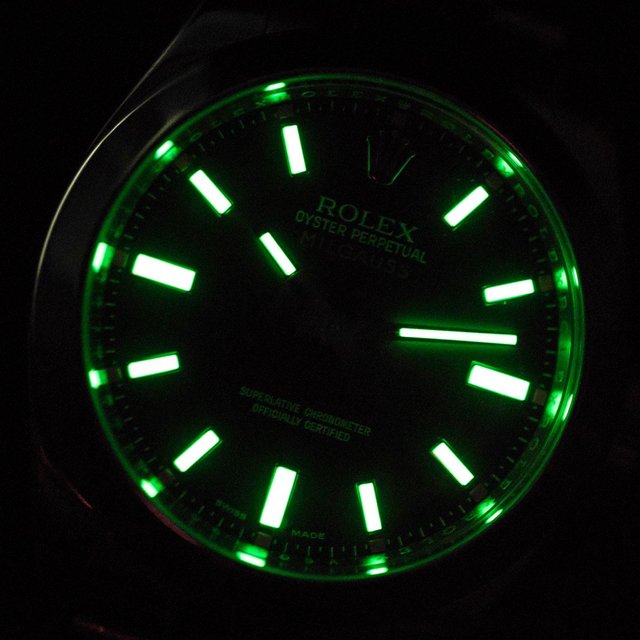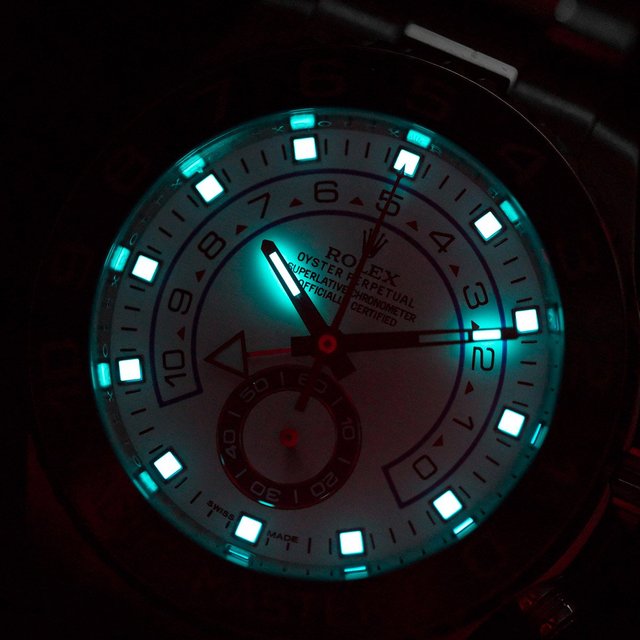시계 형광 물질의 역사/ History of Watch Lume
안녕하세요!
오늘은 20세기부터 현재까지 시계에 쓰였던 야광물질에 관해 짧게 설명해 보려고 합니다.
Hi everyone, today I want to discuss a bit about luminescent materials that were used on watches since the 20th Century until present time.
1898에 라듐이 발견된 이후에, 라듐이 빛을 발산하는 성질을 알게된 사람들은 라듐을 20세기 초중반까지 시계 다이얼에 발라 판매하기 시작했습니다. 하지만 모두가 아시다시피, 라듐의 피폭문제 때문에 1950-1960년대에 들어서는 라듐을 쓰는 사람들이 크게 줄어들었습니다.
After radium was discovered in 1898, people started using radium as luminescent material on watch dials due to its ability to emit light. But as everyone knows, the use of radium as luminescent material decreased drastically after the 1950-1960s due to the fact that it released a large amount of radiation.

Radium Clock Dial By Arma95 - Own work, CC BY-SA 3.0, Image Source
라듐의 방사선 문제를 알게된 사람들은 적은 방사선을 내뿜는 물질/방식을 찾았고, 이는 프로메튬을 (아폴로 루나 모듈에 쓰였었던) 거처 트리튬을 가스형태로 작은 유리관에 담아 방사선양을 최대한 줄이는 방식으로 발전하였습니다. 트리튬은 1990년대까지 많은 고급 시계에 쓰였는데요, 아직도 스위스 시계 다이얼 하단에 “Swiss” 옆에 알파벳 “T”가 있다면 트리튬을 형광물질로 썼다는 뜻입니다. 트리튬의 단점을 하나 말하자면 12년이라는 상대적으로 짧은 반감기 입니다. 이 뜻은 시계가 만들어진 이후로 트리튬은 시간이 지날수록 밝기가 줄어들어 20-30년 이후에는 빛이 글씨를 읽을수 없을정도로 약해진다는 뜻입니다.
After understanding the negative health effects of radioactive materials, people sought for an alternative option that emitted less radiation. After a brief use of promethium as luminescent material (such as its use for the Apollo Lunar Module) people eventually developed a way to use tritium in a way that drastically reduced the radiation. This involved sealing tritium (in a gas form) in vials to reduce exposure. Tritium was used frequently on luxury watches until the 1990s, and one may be able to find vintage watches that still has the alphabet letter “T” by the “Swiss” on the bottom of the watch (which means that the watch uses tritium radioluminescence). One downside of using tritium radioluminescence is that the half life of tritium is approximately 12 years, meaning that tritium’s ability to produce light gradually decreases to a point where the watch will be difficult to read after around 20-30 years.

Rolex Dial with Tritium By Chronext, Image Source
트리튬을 마지막으로 1990년대에 상용화 되었던 형광물질은 일본에서 발명된 Luminova였습니다 (이후 개량된 Super-Luminova). 빛을 충분히 받지 않는다면 빛나지 않는다는 단점이 있지만 방사능을 내뿜지않는 형광물질으로 현재까지 시계는 물론 다른 기기에도 형광 도료로써 자주 쓰이고 있습니다. 물론, 이외에 Rolex에서 자체적으로써 개발한 Chromalight같은 도료도 쓰이고 있습니다.
The luminescent material that became popular in the 1990s and beyond was Luminova (later Super-Luminova), which was developed in Japan in the early 1990s. Although Luminova needs to be charged with light in order to glow in the dark, as a non-radioactive luminescent material it is still used today in watches. Of course, there are other materials such as Rolex’s Chromalight that are used in some other watches.

SuperLuminova’s green light By Paul Altieri, Image Source

Rolex Chromalight’s blue light By Paul Altieri, Image Source
읽어주셔서 감사합니다!
Thanks for reading!
롤렉스 시계를 보니 하나 퐉 지르고 싶은 생각이 듭니다.
트론이 200원가면 하나 지르렵니다 ㅎㅎ
잘읽었습니다 보팅하고 갑니다.
좋은 결과 있기를 바랍니다^^
잘 몰랐던 시계에 대한 세부적인 글이 흥미롭네요. 잘 읽었습니다. :)
읽어주셔서 감사합니다 :)
Congratulations @arx! You have completed the following achievement on the Steem blockchain and have been rewarded with new badge(s) :
Click here to view your Board of Honor
If you no longer want to receive notifications, reply to this comment with the word
STOPDo not miss the last post from @steemitboard: